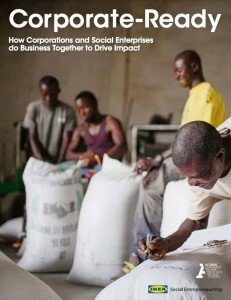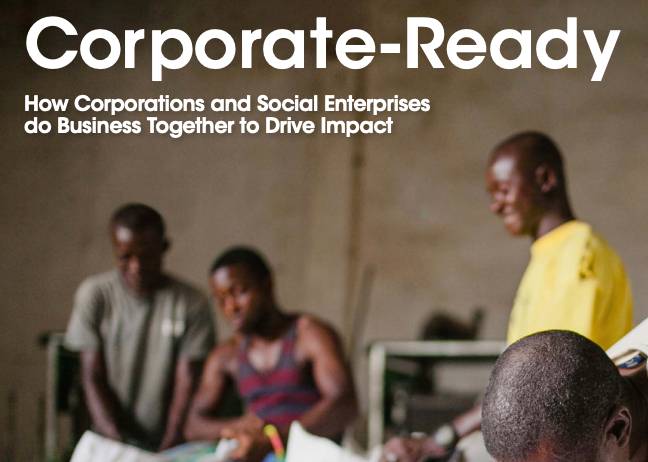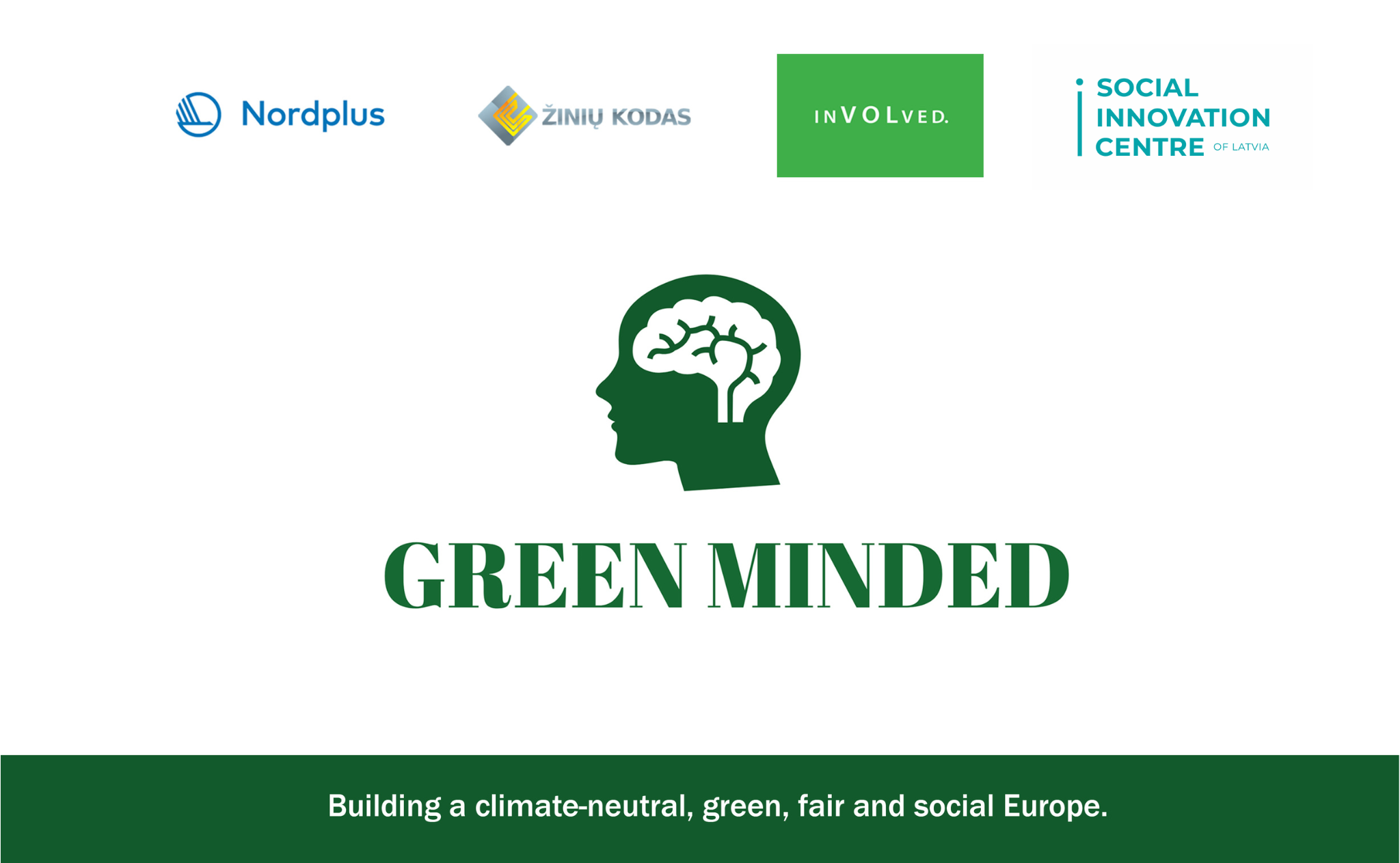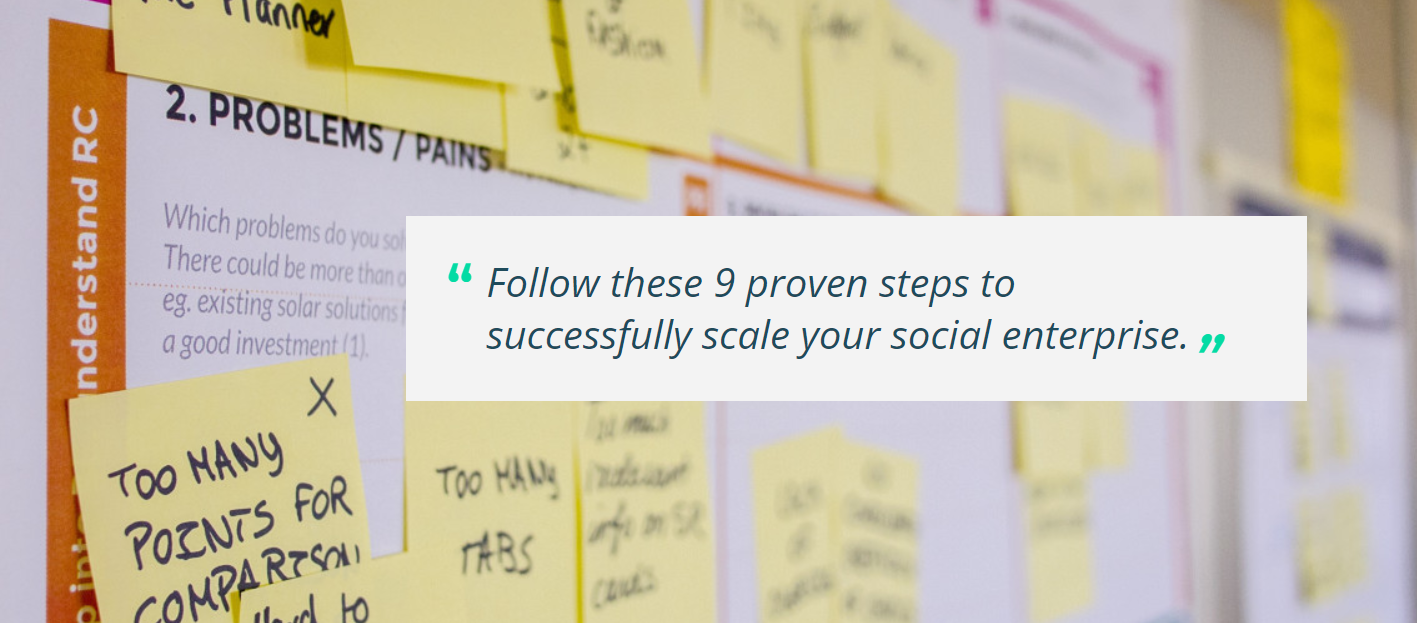Corporate-Ready: How Corporations and Social Enterprises do Business Together to Drive Impact is a new report from Acumen on business partnerships between social enterprises and corporates.
The report as been developed under the auspices of the World Economic Forum (WEF) COVID Response Alliance for Social Entrepreneurs – a network of over 85 different actors that support the ecosystem for social enterprises.
As the title suggests, the report takes a closer look at the concept corporate-ready, which refers to the fact that social enterprises are prepared to sell to private companies. Gaining access to sell their products and services to affluent private companies is something most social enterprises dream of. It is an obvious strategy in terms of making one’s social enterprises more financially sustainable. Therefore, this report is also interesting for social entrepreneurs who want to get closer to being corporate-ready.
There is an opportunity to be inspired by other social enterprises that are already selling to corporates and to get answers to most of the questions that arise in relation to being corporate-ready.
All in all, the report is a brilliant “education material” for social entrepreneurs, in terms of preparing for business partnerships with corporates.
With this rapport Acumen and IKEA Social Entrepreneurship have with support from Ernst & Young (EY), 60 Decibels, and more have sought to develop a kind of framework for achieving “corporate readiness,” by identifying what it really takes for a social enterprise to be ready to sell to corporates.
That framework focuses on four key elements:
It requires that the social enterprise
– can offer a convincing solution / a convincing offer
– can control supply and demand
– has access to capital and
– has the ability and competencies
Background
It is gradually becoming clear that companies of all kinds play a major role in creating a fairer and more sustainable world.
As described in World Goal 17 “Partnerships for the Goals”, all sectors must work together to solve the world’s most pressing challenges. Partnerships between private and social enterprises that work to create business models to solve social challenges can be a contributions in solving these challenges.
For corporates, the benefits in addition to contributing to the sustainability agenda are access to innovative products, services and business models, access to new markets and new customers, more resilient supply chains, brand building and a better ability to attract new employees.
Yet there is surprisingly little information on this kind of business relationships between companies and social enterprises.
And a number of questions arise on that occasion – and social entrepreneurs interested in knowing more on corporate- readiness can among other find answers to the following questions in the rapport:
Do social enterprises have the opportunity to sell to enterprises? And if they have – where and how does it take place? Can social enterprises help corporates to achieve their business as well as social impact goals, and how can this be documented? What are the challenges enterprises face when selling to business customers, and how can these challenges be addressed?
In addition to answering the above questions, it is also the intention that the report should contribute to social enterprises gaining increased access to private enterprise value chains.
The report contains:
A summary where there is an overview of key results from the survey made to examine the company’s corporate readiness as well as the analysis of the survey.
An introduction that takes a closer look at the potential that partnerships between socio-economic and private companies have in relation to creating the transformation that the world needs to become sustainable.
Results from a survey in which 150+ social enterprises participated.
Five in-depth case studies showing social enterprises that are corporate-ready and the private enterprises with which they have formed partnerships.
A conclusion that looks at what it really takes to accelerate a movement that has so much potential for transformation. This is done by describing the next three steps needed to facilitate sourcing from social enterprises.
Finally, the report contains a very interesting and inspiring list of 100 different examples of social enterprises selling to business customers across industries and from around the world.
The list does not include any companies from Denmark, (nor from Norway, Finland, Latvia, Lithuania, Estonia, Polan), but the Swedish company Yallatrappan is represented on the list. Yallatrappan sews eg. interior design products for IKEA and create jobs for immigrant women who have difficulty entering the labor market.
Finally, it is worth to mention a few of the interesting results that the survey behind the report shows:
Social enterprises from 43 different countries have responded to the survey, and out of them more than 50% answer that they have sold to corporates for more than three years and more than 72% of them sell to more than five corporate customers.
In this way the report shows that social enterprises from all over the world are already selling to corporates.
75% of the participating companies also answer that they measure their impact in relation to the UN’s world goals.
Finally, the survey also shows that social enterprises have challenges in connection with their business partnerships, this is especially true in relation to agreeing prices and payment and delivery conditions.

Read the Corporate-Ready report here
This publication has been prepared within SENBS project No. 2020- 1-EE01-KA204-077999. The content of this publication is the sole responsibility of the project coordinator and may not always reflect the views of the European Commission or the National Agency.
















Thanks a lot for the post.Really looking forward to read more. Much obliged.